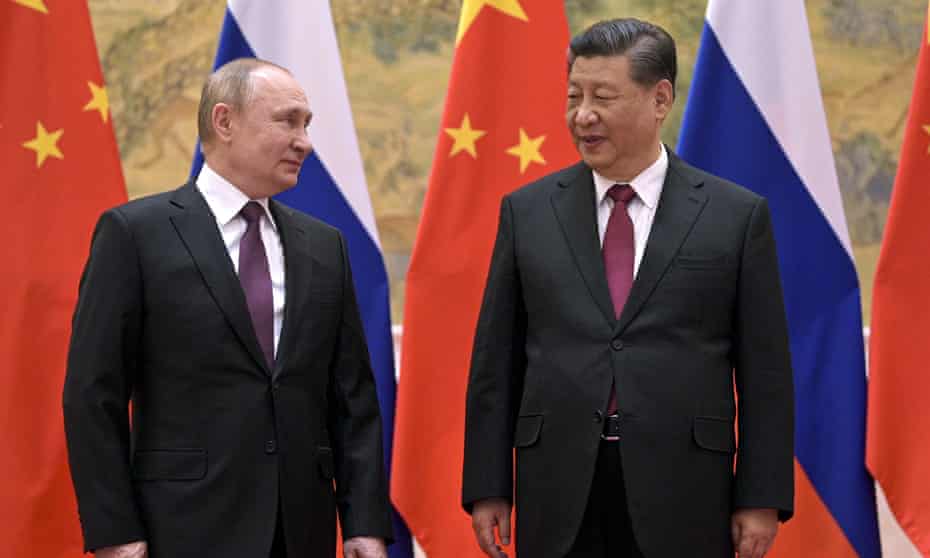
‘They were fooled by Putin’: Chinese historians speak out against Russian invasion
An open letter written by five historians denounced the war. They hope to persuade Beijing to make their stance clearer
Vincent Ni China affairs correspondentSun 27 Feb 2022 22.04 EST
For Xu Guoqi, a Chinese historian, Beijing’s reluctance to denounce Vladimir Putin’s invasion of Ukraine is alarming. “I’m a historian of the first world war. Europe sleep-walked into a huge conflict over 100 years ago, which also had had enormous consequences for China,” Xu said. “The world may be at the point of no return again”.
But looking at how Chinese diplomats are responding to it, and how Chinese people have talked about it on social media in the past week, he said, “I’m afraid it seems we still have not learned the lessons of the past tragedies. As a historian I’m very disappointed.”
On Saturday morning, five renowned Chinese historians – Xu included – wrote an open letter denouncing Russia’s action on its neighbour and calling for peace. The authors of the letter hope to persuade Beijing to make its stance clearer: that what Russia is doing is wrong, and China should say it out loud.
“What will this war lead to? Will it lead to a large-scale world war?” the historians asked. “Great catastrophes in history often started with local conflicts… We strongly opposed Russia’s war against Ukraine. Russia’s invasion of a sovereign state by force … is a violation of the norms of international relations based on the United Nations charter and a breach of the existing international security system.”
In public, China opposes any act that violates territorial integrity. China’s foreign minister, Wang Yi, articulated this position again in a late-night post published on his ministry’s website on Friday. But over the course of the past week, as civilians were killed and western sanctions intensified, Beijing continued to echo Putin’s argument that Moscow’s action is a response to Nato’s eastward expansion.
As Chinese historians, we do not wish to see China being dragged into something that will fundamentally harm the current world order
Xu Guoqi
“Do they genuinely believe in that? Is it worth [it] for China to undermine its own credibility to defend the indefensible? I’m afraid they were fooled by Putin,” Xu said, emphasising that he and his colleagues wrote this letter because they love the country, and they do not wish a potential worldwide tragedy to stall China’s future.
“This is simply a black and white matter,” he continued. “This is an invasion. As the Chinese saying goes: you cannot call a deer a horse. As Chinese historians, we do not wish to see China being dragged into something that will fundamentally harm the current world order. For the love of mankind, world peace and development, we should make this clear.”
But Xu and his colleagues’ open letter was quickly taken down by internet censors after two hours and 40 minutes online. And, perhaps unsurprisingly, pro-war Chinese trolls denounced the authors – who are based in Nanjing, Beijing, Hong Kong and Shanghai – as “shameful” and “traitorous”. “Why did you not say anything during the west’s invasion in Iraq,” one quipped sarcastically.
Is Beijing changing its thinking?
It is difficult to gauge the public opinion in China, but in the past few days, while Beijing’s diplomats struggle with a coherent argument, many Chinese nationalists expressed their admiration of Putin online. Some called the Russian leader “the greatest strategist of this century”. Others said China should leverage the current situation to “take Taiwan back”.
But at the same time, censors are not taking down all anti-war posts, either. On WeChat, for example, many have also been discussing the situation in Ukraine. On Sunday, as Putin ordered his military to put Russia’s nuclear deterrence forces on high alert, some users posted a 1994 statement in which China urged all nuclear-weapon states not to use or threaten to use nuclear weapons against states that do not have them, including Ukraine.
There is a long history of Chinese intellectuals speaking out, individually or collectively, on major domestic and international issues, including in ways that challenge official policies, said Prof Jeff Wasserstrom, a historian of modern China at the University of California, Irvine. “Sometimes the risks involved are small but at other points it is truly daring to engage in this time-honoured practice.”
But Wasserstrom said the five prominent Chinese historians’ letter was particularly noticeable because of the tightening of the freedom of speech on Chinese campuses – both on the mainland and in Hong Kong – in recent years. Several high-profile Chinese academics have been barred from teaching.
As the war intensifies, there are signs that Beijing may be changing its thinking. On Friday, China abstained at the end of the UN security council vote condemning the Russian aggression. Western diplomats saw this as a sign that Beijing is increasingly uneasy at being seen as defending Putin’s action, which has drawn worldwide condemnation.
On Sunday, the Chinese envoy to Kyiv, Fan Xianrong, stressed in a video address that China respected Ukraine’s sovereignty and territorial integrity. He also urged Ukraine-based Chinese nationals not to reveal their identity or display any signs of their nationality, reversing his embassy’s earlier advisory that encouraged citizens to stick the national flag on their cars.
“Sooner or later, they’ll have to come to [their] senses,” Xu said. “The Chinese are very pragmatic. They need to understand they are a big beneficiary of the current world order, under which China also prospered. This is an opportunity for all of us to demonstrate we are a real responsible stakeholder.”